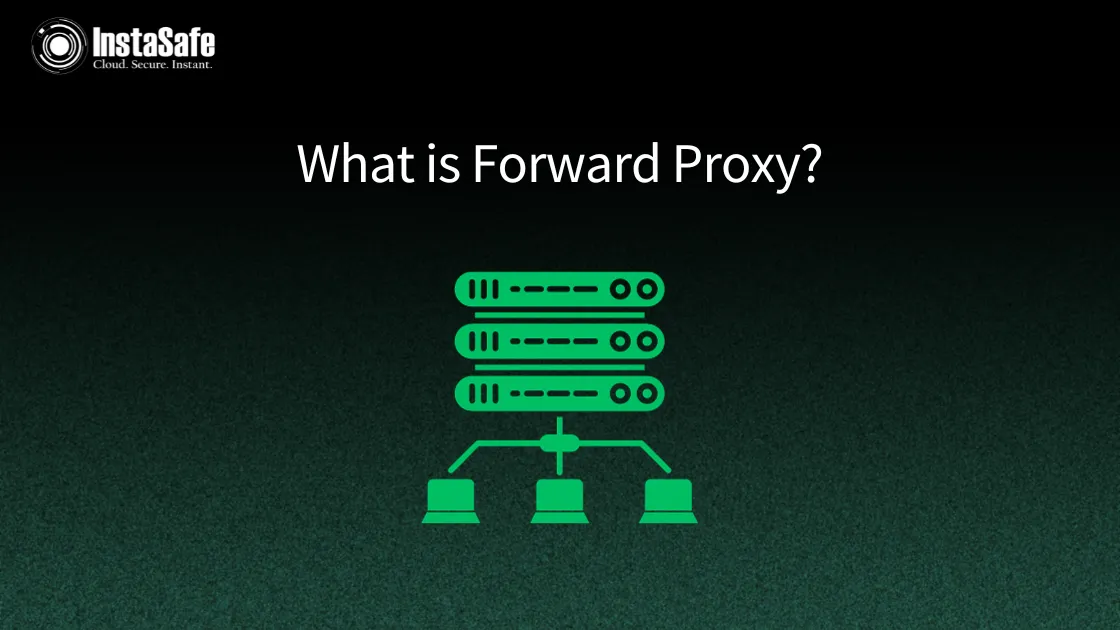What is Forward Proxy?

Security, privacy and efficient connection are paramount to any web server administration. One thing that plays a critical role in maintaining all these is proxy servers.
A proxy server is a server that works as an intermediate or middleman for requests from users who are accessing data from another server.
There are various types of proxy servers, each with its own working and use cases. One such proxy server is the forward proxy. But what exactly forward proxy is? So, in this blog, we will understand in detail about forward proxy.
Understanding of Forward Proxy
Forward proxy solution provides enhanced security to users' devices by preventing direct access to the internet and blocking all bad actors immediately. A forward proxy is an intermediary or middleman between the public internet and user devices.
It means all the web traffic first flows through the proxy server; the server inspects the traffic and applies corporate security policies if needed before sending it to a destination on the client's behalf.
In simple language, all the web request from the user's device first goes through a forward proxy server.
Then, it gets filtered based on the rules suggested by a system administrator before reaching the destination. It ensures all the internal and external resources are protected and monitored on various access levels.
How Does a Forward Proxy Work?
The user's device with the internet is configured with a proxy server so that every request made by the user is routed through the proxy server. Whenever the forward proxy server receives the request, the first thing the server does is check the request for rules and policies set by the device administrator.
Organisations have established various policies to protect their assets and resources, such as verifying IP addresses, limiting access to specific geographical locations and more. After checking all the regulations set by the organisation, it will either approve or deny the user's request.
If the request is approved, the forward proxy server will send the user's request to the destination. If the user’s request demands a response from the destination, the proxy server will perform additional actions by inspecting it for malicious content before sending it to the user's device.
Benefits of a Forward Proxy
There is an array of benefits offered by the forward proxy, such as:
- Policy Enforcement - The first benefit of the forward proxy is policy enforcement. It allows organisations and businesses to control web access based on the rules and policies set by the organisation. By doing policy enforcement for web access it prevents any kind of attacks and breaches.
- User Privacy - Another benefit offered by the forward proxy is user privacy by masking the IP address. It ensures that the user's identity is well protected over the internet. Forward proxy, in general, masks the user's real IP address when they access the resource and does work over the web. It means the device using a forward proxy server when accessing any web-based resources will get the forward proxy IP address so that the user's identity will remain anonymous.
- Improved Traffic Visibility - Other than offering privacy to users, forward proxy also offers enhanced visibility on the outbound traffic. Since all the traffic is routed through proxy servers, it will give insight into the user's activity. Further, it enables identification and mitigation processes in case of potential threats.
- Shadow IT Detection - The devices and equipment used without IT approval generally fall under the Shadow IT category. Another advantage of forward proxies is they can identify such devices. Thus preventing any data breaches.
Use Cases of Forward Proxy
Forward proxy can be used for meeting various security requirements in any organisation, such as:
- Web Security - The very first use case of the forward proxy is it helps businesses in implementing enhanced security measures. An organisation can inspect the request made by a corporate user's device. Further, by enforcing policies, the organisation can deny or approve access based on the policies set by the organisation. Forward proxy in place generally helps in filtering out malicious content from responses.
- Corporate Privacy - If the organisation doesn't have security measures in place, the attackers can map the internal structure of the organisation with vulnerabilities for exploitation. Forward proxy will be a step ahead of the protection by hiding the corporate user's IP on the web.
- Data Protection -It is common for organisations working in the cloud to upload data in inappropriate locations. The forward proxy blocks the traffic flow of sensitive data sent to inappropriate locations.
Difference Between Forward Proxy and Firewall
It is easy to get confused between forward proxy and firewall since they both inspect and block outbound traffic. However, there is a significant difference in both based on certain factors that are listed below:
- Purpose - The purpose of both forward proxy and firewall is different. A firewall provides access control over network boundaries and blocks threats. The primary function of a forward proxy is to enforce organisation policies and rules for internal users.
- Scope - The function of a traditional firewall is to inspect the web traffic, while a forward proxy makes sure that the web traffic is secure.
- Directionality - Another difference between a forward proxy and a firewall is its directionality. Forward proxy generally monitors the inbound request and inspects the outbound request, while the firewall inspects both inbound and outbound connections entering the network.
Conclusion
Forward proxy is undoubtedly a powerful security tool for businesses that don't want to compromise network security. However, businesses now look for solutions that can offer enhanced protection to their assets and resources.
And when it comes to choosing the security solution for your business, go with a vendor with a reputation in the market.
One such name is InstaSafe, a security solution for businesses that offer comprehensive protection on on-premises and cloud networks.
InstaSafe Zero Trust Security solutions are designed to verify trustworthiness for every device and user trying to access resources on a network, rather than relying solely on perimeter defences like the "Castle and Moat" model.
Frequently Asked Questions
- How does a Forward Proxy enhance security?
When a user requests web access, instead of directly granting him access, the request first goes through a forward proxy server, which analyses the request with organisation policies and rules and then, if everything is okay, approves the request by sending it to the destination location. This whole procedure prevents malicious behaviours and activity.
- Is VPN a Forward Proxy?
VPN (Virtual Private Network) is not a forward proxy. While both VPNs and forward proxies can be used to protect online privacy and security, they serve different purposes.
- What are Some Benefits of Forward Proxy?
Some of the core benefits of the forward proxy are shadow IT detection, data protection and more.
Key Products
MFA | I&AM | ZTNA | Zero Trust Application Access | Secure Enterprise Browser
Key Features
Single Sign On | Endpoint Security | Device Binding | Domain Joining | Always On VPN | Contextual Based Access | Clientless Remote Access | Device Posture Check
Key Solutions
VPN Alternatives | DevOps Security | Cloud Application Security | Secure Remote Access | VoIP Security
